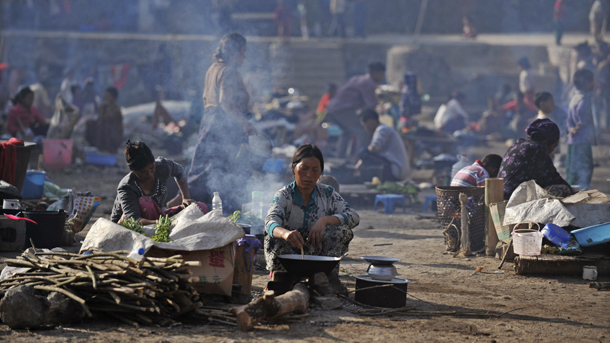As armed conflict between the Kachin Independence Army and the Burmese army drags on, HIV/AIDS patients in some refugee camps in Kachin State are facing a lack of anti-retroviral (ARV) drugs, according to relief workers.
“Artsen Zonder Grenzen [AZG, a Dutch NGO] was providing ARV drugs to HIV/AIDS patients in our area, but it couldn’t after the patients moved to refugee camps,” said Thein Wan, a nurse working in the Magayang refugee camp on the Sino-Burmese border.
“The patients are also unable to leave the camps to get the ARV drugs because of poor transportation and security concerns, so most of them have just stopped taking the drugs,” she added.
Scores of patients have died because their treatment has been interrupted, health care workers in the camps reported. Government officials say they are aware of the problem, but are unable to do anything about it.
“Ordinary medicine can be provided by either our government or other donors, but ARV drugs can only be given by concerned organizations,” said Bauk Jar, the Kachin State government’s minister for social welfare, relief and resettlement.
While refugees in camps located in Myitkyina, Bhamo and Waimaw townships have relatively easy access to AZG clinics, patients in border camps and areas such as Panwa, Kanpipetee and Mansi have a much harder time getting ARV drugs.
“We had to go through China in order to access the AZG clinic located in Laiza [in Kachin State on the Sino-Burmese border]. Since we don’t have passports, we had to use a jungle route and walk to reach our destination. It was too difficult, so in the end we just decided to try to live without the medicine,” said an HIV/AIDS patient from the Magayang camp.
Aid groups working with the refugees say they are trying to help the HIV/AIDS patients displaced by the ongoing conflict, but have no easy way to get their hands on the drugs they need.
“Our main concern is providing food and shelter for all of the refugees. That doesn’t mean that we can’t think about providing ARV drugs, but we face a lot of difficulties, due to poor transportation and a lack of funding,” said Min Htet Nyein Chan, a member of Sein Yaung So (The Green), an organization providing aid to war refugee camps in Kachin State.
According to UNAIDS, the United Nations HIV/AIDS program, there are an estimated 240,000 people in Burma infected by HIV, half of whom do not have access to medication. Around 18,000 people in the country die of AIDS annually due to limited access to ARV drugs.

















